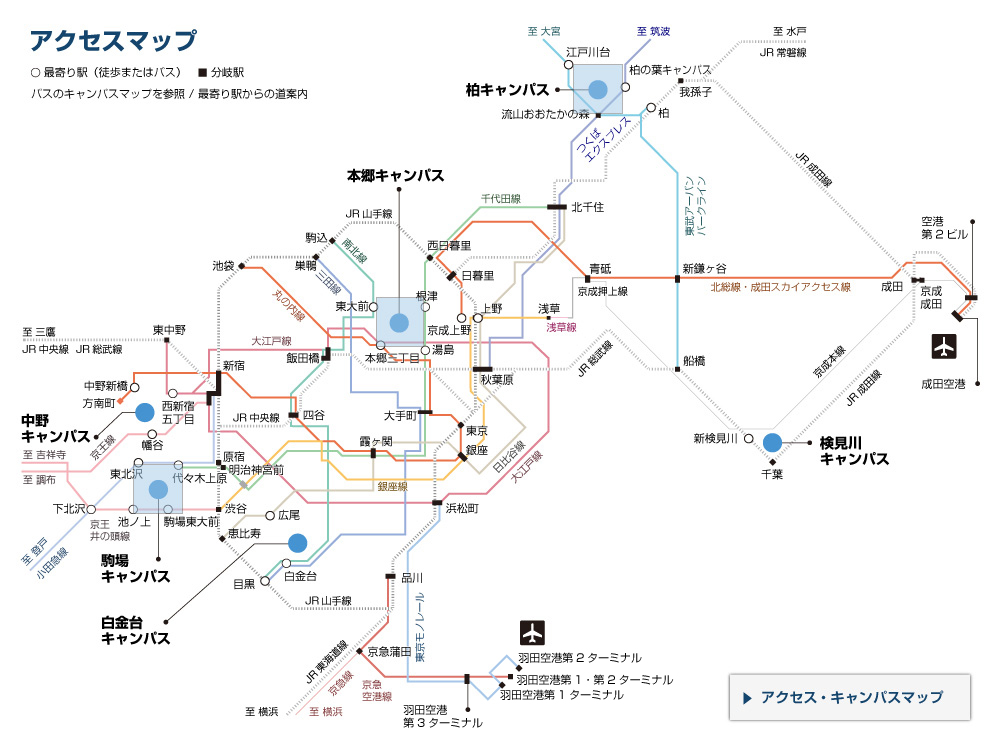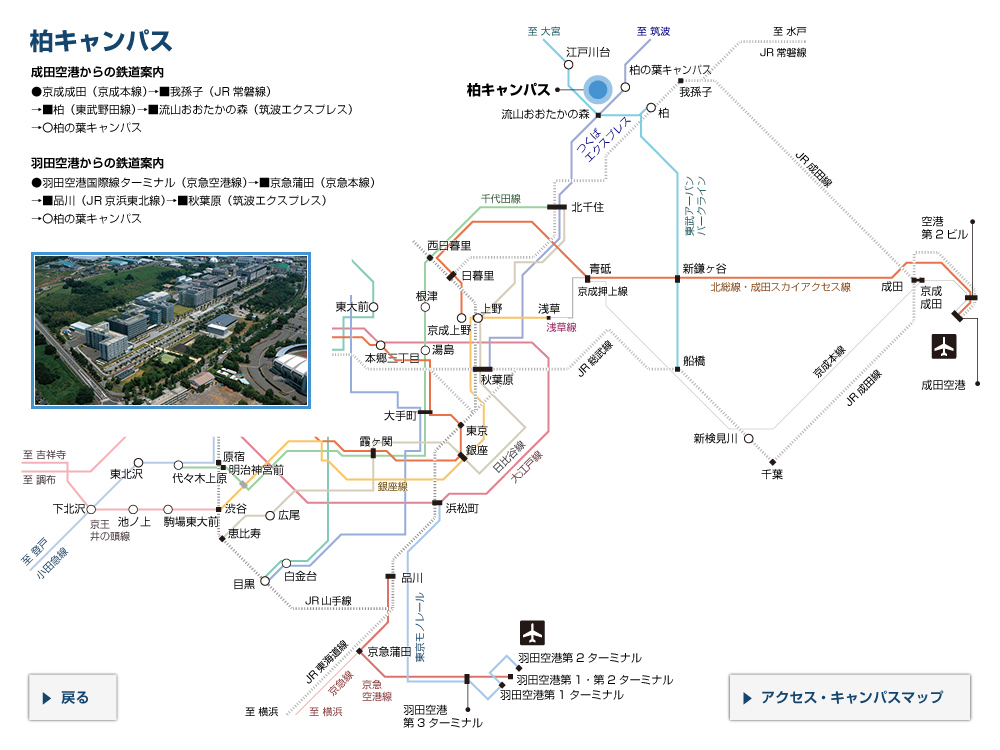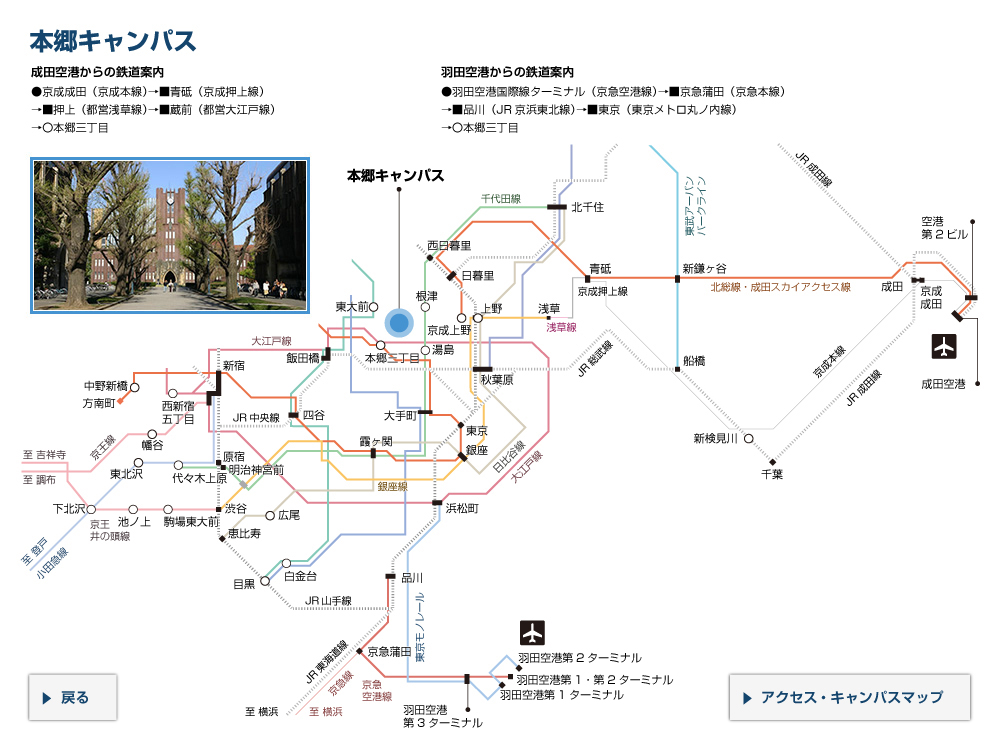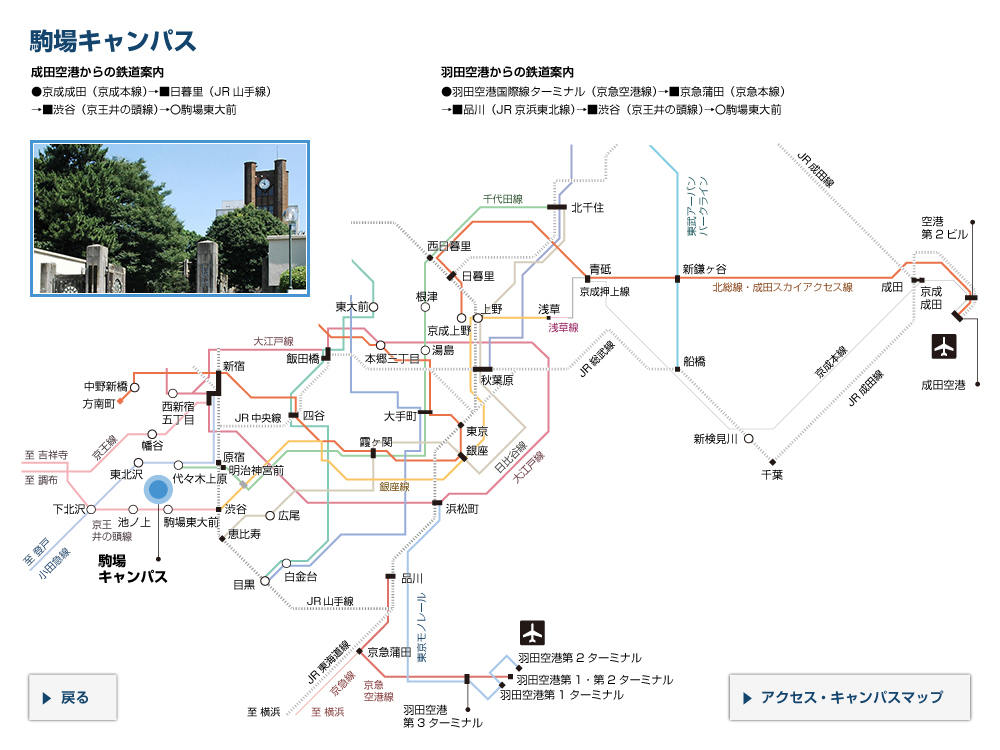北京フォーラム2018 総長基調講演


北京フォーラム2018 総長基調講演
Keynote speech by the University of Tokyo President Makoto Gonokami at the Beijing Forum 2018
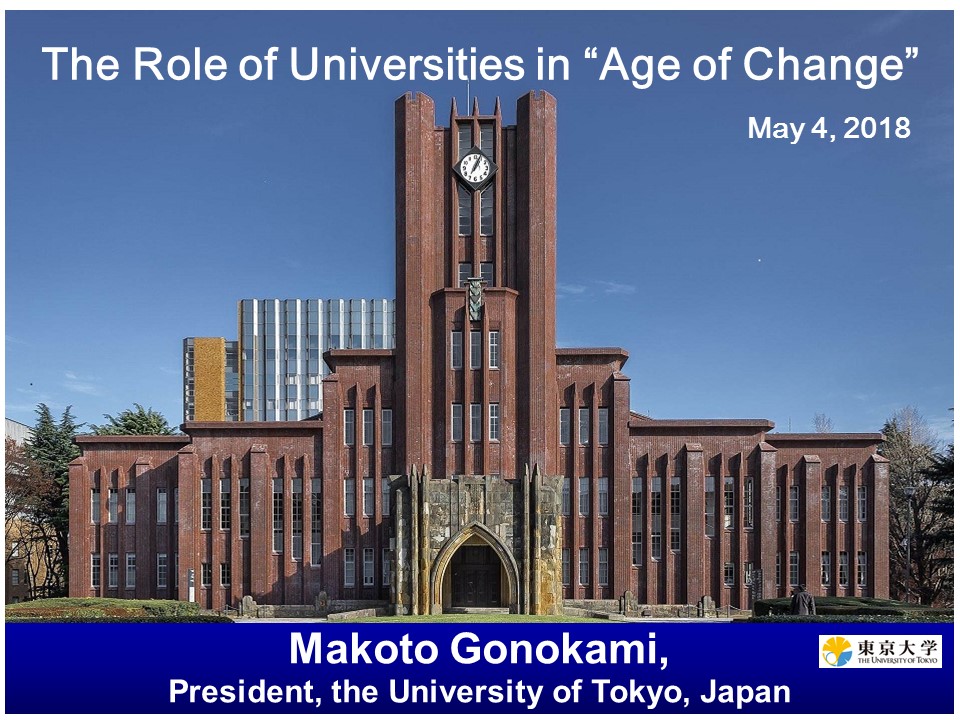 Good afternoon, distinguished guests. It is a great pleasure to be with you here today, and a great honor to give a Keynote speech at this "Beijing Forum."
Good afternoon, distinguished guests. It is a great pleasure to be with you here today, and a great honor to give a Keynote speech at this "Beijing Forum."
I would also like to offer my congratulations to Peking University on their 120th Anniversary. I am very glad to be here with you on this day. I would like to take this opportunity to congratulate the outstanding achievements of Peking University. I also congratulate Peking University for being listed as a World-class university in the project supported by the Chinese government, last year. I hope that this project will foster generations of talented students.
The topic of this forum is “Changes and Constants : Universities and Civilizations during the Past 120 Years.”
Today, we are experiencing rapid development in information and communication technologies, also called the “digital revolution.” This is bringing about a historic transformation, both in our economies and societies. This change is very fast and its impact is enormous. “Predicting the future” is becoming more and more difficult.
The occasion of Peking University’s 120th Anniversary, is a good opportunity to look back into the past and think about our future together. We often use such anniversaries to celebrate the accumulated years. But we can also find new ideas from the past, if we look at the past from the viewpoint of the present. At each milestone, such as, the 50th, 100th, 120th anniversary, we look back into history and create new ideas. This new knowledge will help us to bring about a new age.
Today, our society is changing rapidly. Taking the topic from today’s Forum, we can definitely say that we are now in an age of “Change”. We, as academics, should act proactively in this change so that we can guide humanity to a better future. At the same time, there are things that will not, and should not change. In other words, there are “constants.” In the age of “Change,” we must think about such things.
Research in universities works on diverse timescales. For example, the subject of our research ranges from, the 13.8 billion year-history of our universe to ultrafast phenomena that occur in a very short time, in the scale of attoseconds, which is 10-18 seconds. So, the university is an ideal place for experts to examine the value of current change from a long-term viewpoint. Universities have a responsibility to present a vision of how that change will shape our future.
Our human society is at a serious transition point. The world is changing rapidly. Problems are becoming more and more complicated. Many of these problems do not have simple solutions. We need new ideas to solve them. To create such new ideas people with diverse strengths must cooperate with each other. Universities have experiences and individual strengths that have been fostered in their respective cultures. I think that universities should take the lead in creating a new society. We can do this effectively by cooperating with each other, by linking these strengths, and learning from each other’s experiences.
I would like to introduce you to some of the activities that have taken place in Japan, and in particular at the University of Tokyo. I hope these examples will offer a hint to how universities can work together to create a better society. Of course, science, technology and innovation, are recognized as a key driver for economic growth and prosperity. New technologies, however, may create new challenges for our society. They could also make existing challenges worse. So, how should we use and manage new technologies to achieve sustainable development for all humanity and bring about a better future? I would like to discuss this in relation to Japanese government policy and our University’s activities.
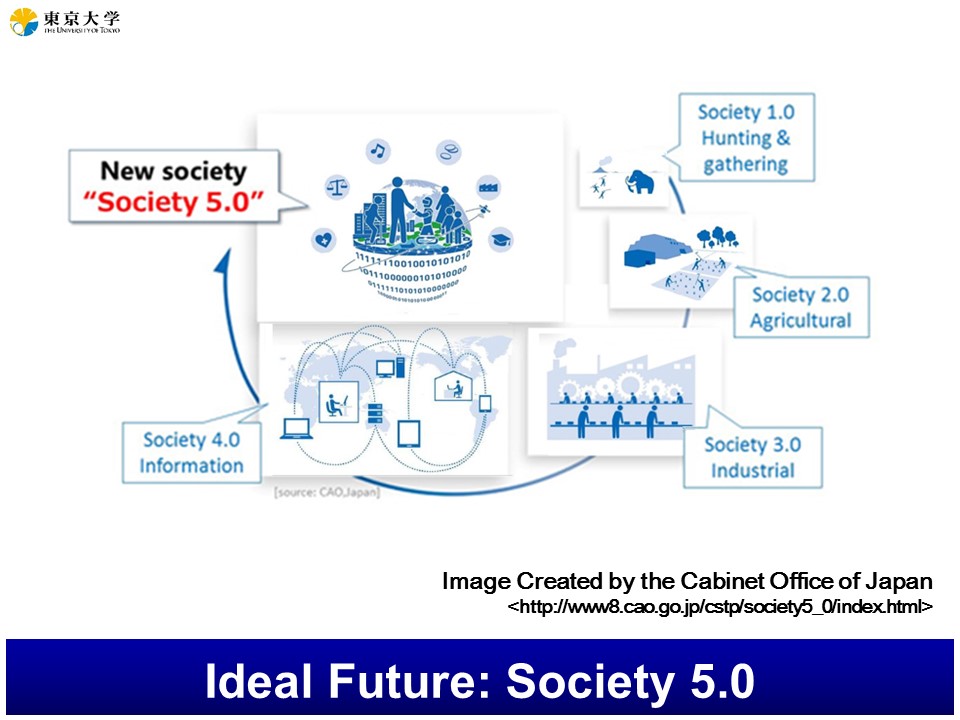 As I mentioned earlier, we are experiencing a “digital revolution.” Some call it “the 4th Industrial Revolution.”
As I mentioned earlier, we are experiencing a “digital revolution.” Some call it “the 4th Industrial Revolution.”
In September 2016, I became a member of the “Council on Investments for the Future.” This council is organized by the Prime Minister’s Office in Japan. We discussed what kind of future society we want to create and what investments are needed to realize it. We argued that the 4th Industrial Revolution is a great opportunity to solve difficult social issues and create a better future society for all. By utilizing new technologies, we can reduce disparities of many kinds. We named this ideal future, as “Society 5.0.” The important point is that we can create an “inclusive society", where diversity is valued and everyone can achieve their full potential. Now, all sectors of Japanese society are working together to realize this “Society 5.0.”
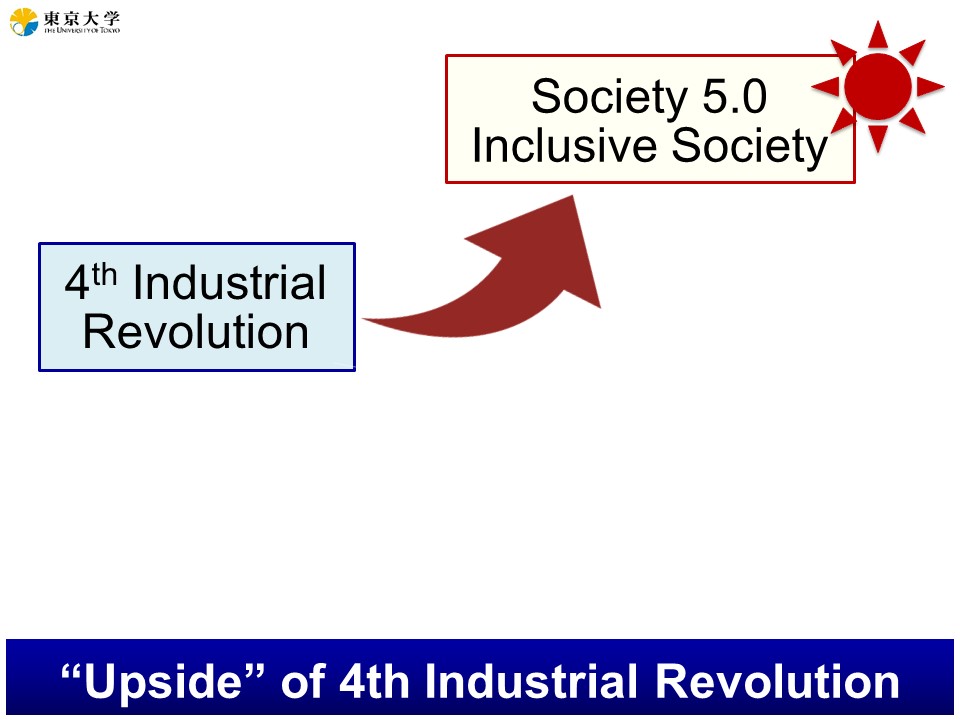 I think we can call this, an “upside” of the 4th Industrial Revolution. Science, technology and innovation are key to solving difficult social issues and to creating a better future society. We can say this because we have experienced it already in Japan. I would like to give you an actual example.
I think we can call this, an “upside” of the 4th Industrial Revolution. Science, technology and innovation are key to solving difficult social issues and to creating a better future society. We can say this because we have experienced it already in Japan. I would like to give you an actual example.
I was born in 1957. When I was a child, Japan achieved rapid economic growth, sometimes up to 10% per year. On the other hand, pollution became a serious social issue. For instance, at that time, I used to live near the “Tama River,” Tokyo. I remember that it was heavily polluted with domestic wastewater.
But now, as you can see in this picture, it is very clean. This is because of technological advances. Technologies to purify sewage and polluted water were greatly improved. The Water Pollution Control Law, which was introduced in 1970, was also important.
Let me give you another example from the 1970s. When cities like Los Angeles were suffering from heavy air pollution, the government of the United States passed an amendment to the Clean Air Act, also known as the Muskie Act. It mandated a great reduction in automobile emissions. It was a very difficult challenge for car companies, but eventually, a Japanese company invented a new engine that met this very high standard. This kind of hard work and sustained effort by Japanese car companies, contributed greatly to the economic success of the Japanese automobile industry.
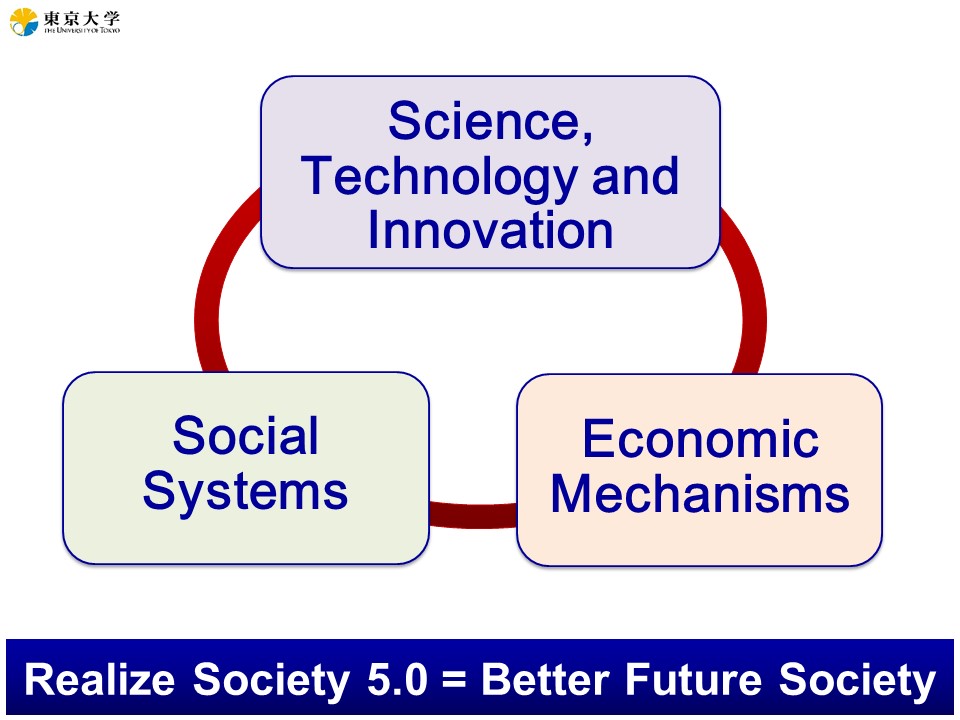 These examples show that new technologies are important for solving social issues. At the same time, they show that linking these new technologies with economic activity is also important. To solve social issues, we need to design three things appropriately. They are science, technology and innovation, social systems design, and economic mechanisms.
These examples show that new technologies are important for solving social issues. At the same time, they show that linking these new technologies with economic activity is also important. To solve social issues, we need to design three things appropriately. They are science, technology and innovation, social systems design, and economic mechanisms.
This process requires great creativity. This is where academia can make a great contribution. Our strength is creating new knowledge and educating the people who can use it. Academia today can provide comprehensive and objective input, to design innovation, social systems, and economic mechanisms. I believe that academia is a key player in creating a better future society.
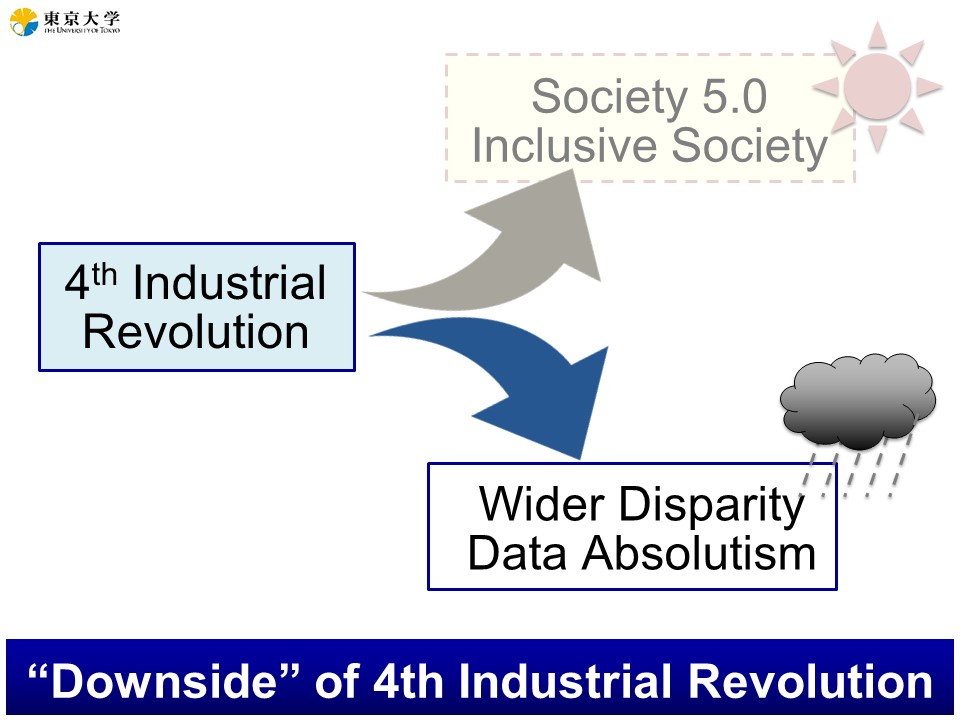 On the other hand, there are people who are concerned, that the 4th Industrial Revolution will accelerate the increase of disparities of many kinds. For example, in a digitalized economy, the amount of data that companies have and can use will be critical to business success. Data tends to accumulate to those who already have an advantage. The early starters will find it easier to gather more and more data. This will eventually lead to only a few enterprises monopolizing data. This will create a severe gap between those who have data and those who do not. Some call it “data absolutism.” Perhaps, we can call this, a “downside” of the 4th Industrial Revolution. This kind of concern was raised during the World Economic Forum Annual Meeting in January at Davos.
On the other hand, there are people who are concerned, that the 4th Industrial Revolution will accelerate the increase of disparities of many kinds. For example, in a digitalized economy, the amount of data that companies have and can use will be critical to business success. Data tends to accumulate to those who already have an advantage. The early starters will find it easier to gather more and more data. This will eventually lead to only a few enterprises monopolizing data. This will create a severe gap between those who have data and those who do not. Some call it “data absolutism.” Perhaps, we can call this, a “downside” of the 4th Industrial Revolution. This kind of concern was raised during the World Economic Forum Annual Meeting in January at Davos.
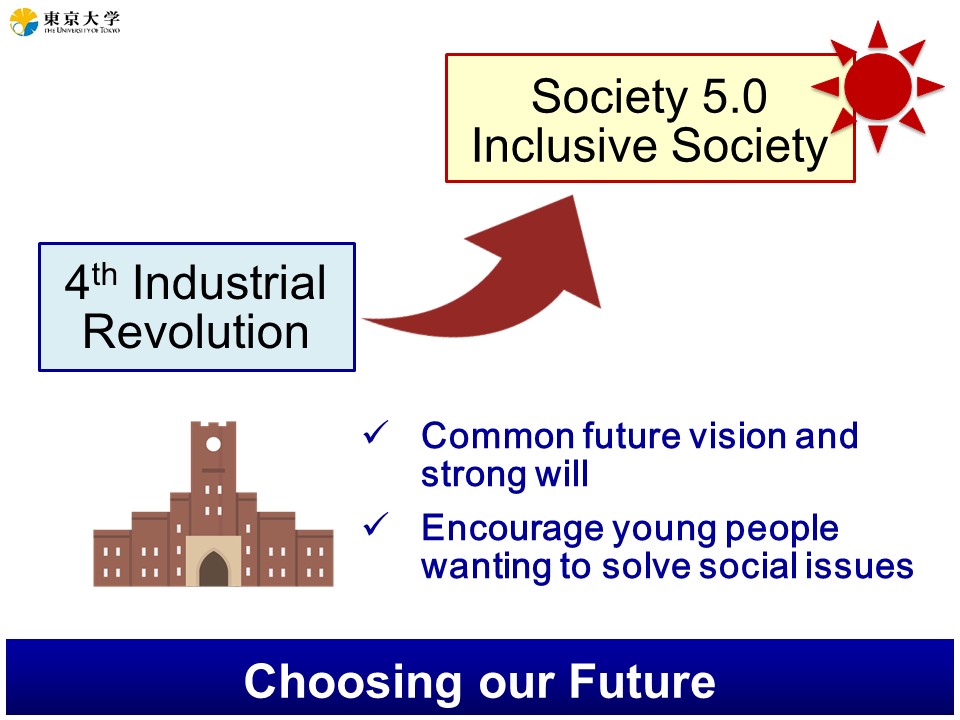 So, we are now standing at a crossroads. We need to work together so that we all can enjoy the “upsides” of the 4th Industrial Revolution. To make this possible, we need the following two things. One, we should share a common vision of the future and work towards it with a strong will. Two, we should encourage people, especially young people, who want to contribute to solving social issues. The university is the best place to do both.
So, we are now standing at a crossroads. We need to work together so that we all can enjoy the “upsides” of the 4th Industrial Revolution. To make this possible, we need the following two things. One, we should share a common vision of the future and work towards it with a strong will. Two, we should encourage people, especially young people, who want to contribute to solving social issues. The university is the best place to do both.
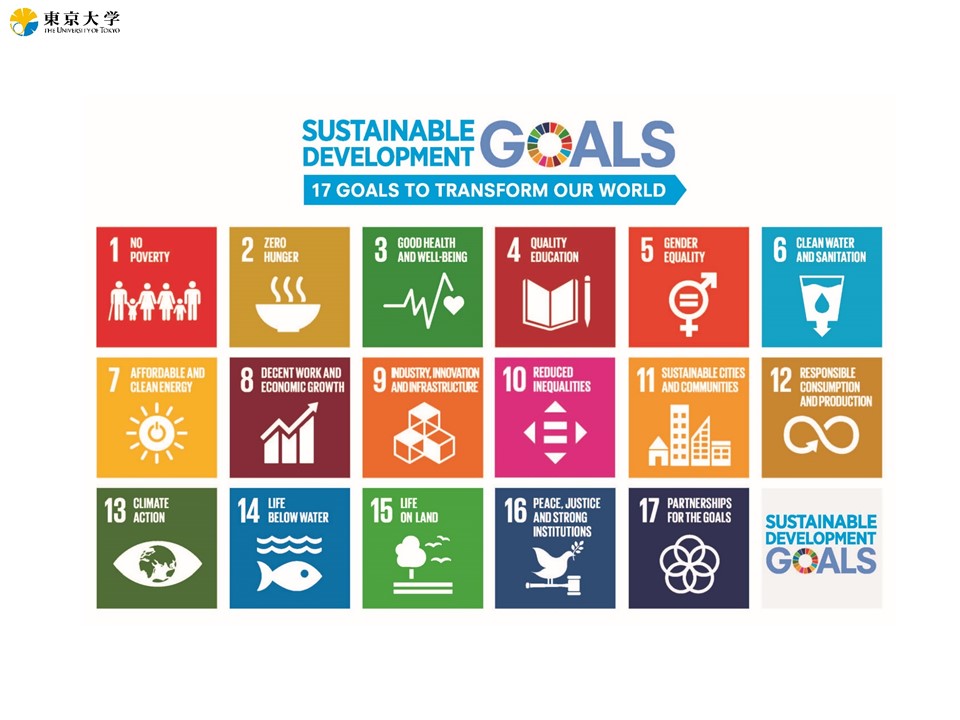 The Sustainable Development Goals, which were proposed by the United Nations in 2015, are a good tool for sharing a common vision of the future. The SDGs and Society 5.0 have much in common. Both seek to create an inclusive society and both are driven by science, technology and innovation.
The Sustainable Development Goals, which were proposed by the United Nations in 2015, are a good tool for sharing a common vision of the future. The SDGs and Society 5.0 have much in common. Both seek to create an inclusive society and both are driven by science, technology and innovation.
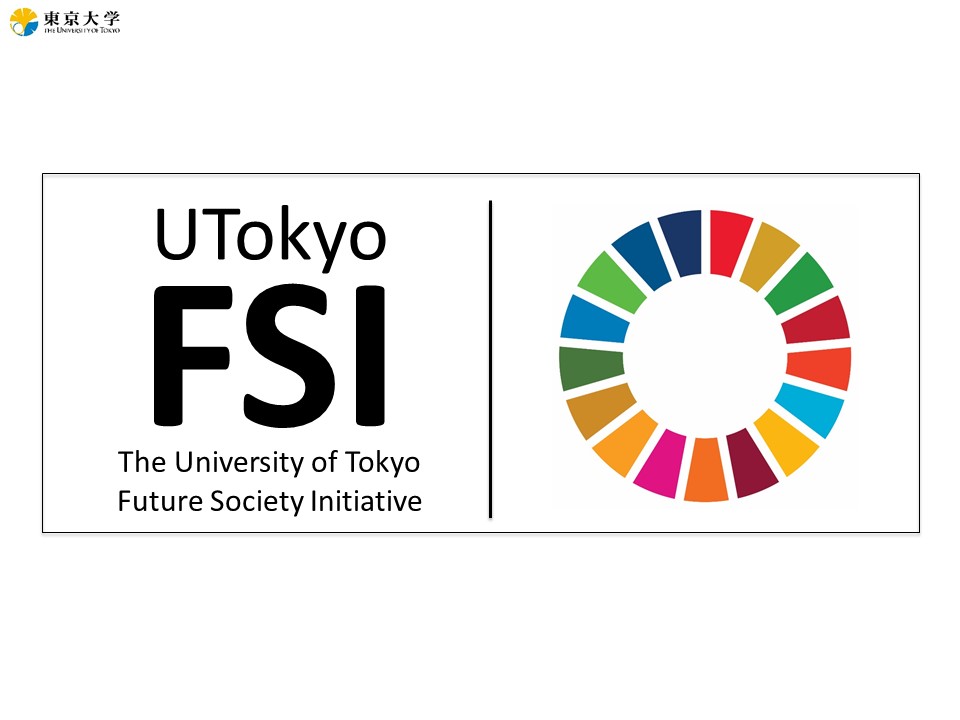 At the University of Tokyo, in July 2017, we launched a university-wide program called the “Future Society Initiative”. The aim is to promote science, technology and innovation for achieving the SDGs. We do this by making full use of our academic resources across the sciences, engineering, humanities and social sciences.
At the University of Tokyo, in July 2017, we launched a university-wide program called the “Future Society Initiative”. The aim is to promote science, technology and innovation for achieving the SDGs. We do this by making full use of our academic resources across the sciences, engineering, humanities and social sciences.
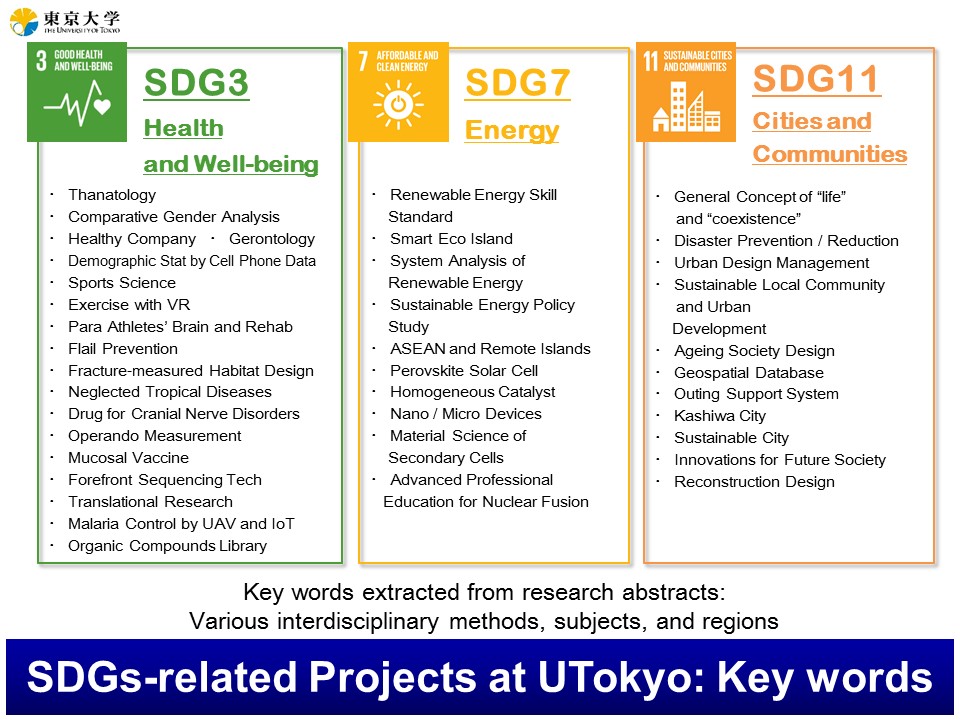 We have many research activities relating to all 17 of the SDGs. Here, I am showing list of activities for goals 3, 7, and 11. You can see that many activities are already in action.
We have many research activities relating to all 17 of the SDGs. Here, I am showing list of activities for goals 3, 7, and 11. You can see that many activities are already in action.
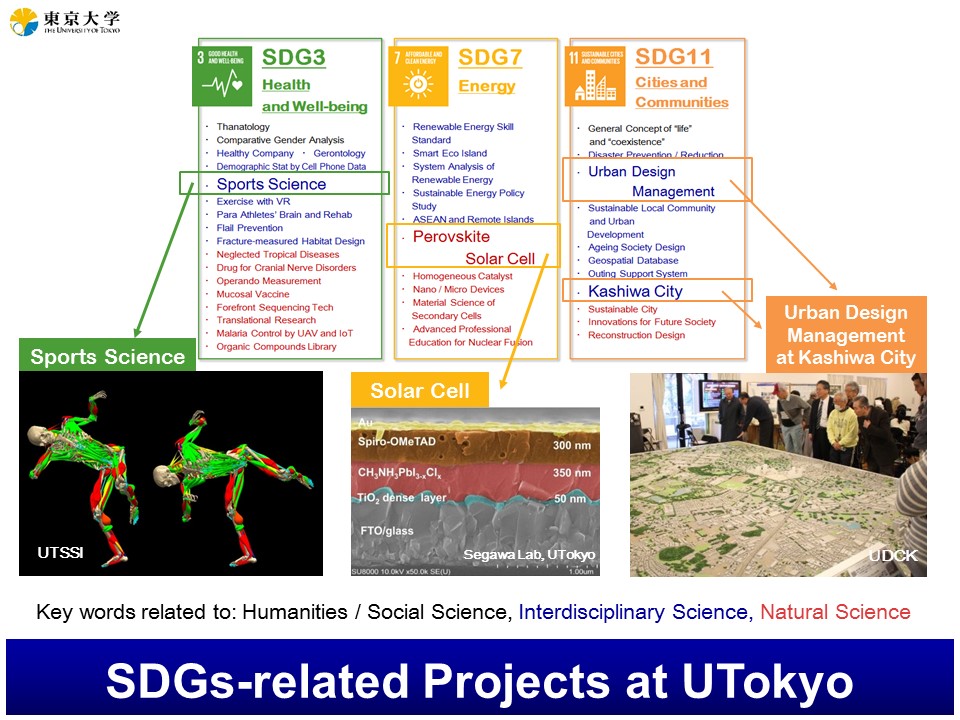 For example, for goal 3, “Health and Well-being,” we have Sports Science project. For goal 7, “Energy,” we have a project on Solar Cell. For goal 11, “Cities and Communities,” we have a project on Urban City Design. Various departments are involved in these activities. Many of them are inter-disciplinary.
For example, for goal 3, “Health and Well-being,” we have Sports Science project. For goal 7, “Energy,” we have a project on Solar Cell. For goal 11, “Cities and Communities,” we have a project on Urban City Design. Various departments are involved in these activities. Many of them are inter-disciplinary.
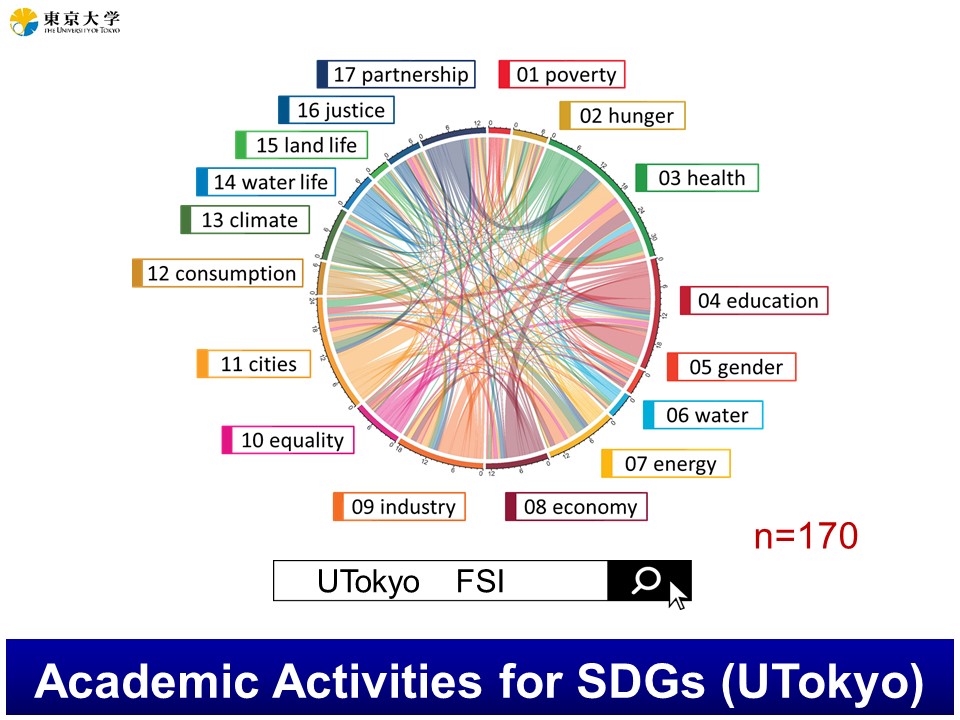 We examined the interconnectivity of about 170 ongoing projects, registered under this initiative. As you can see in this diagram, we have projects for all 17 of the SDGs, in the wide range of research and education at our university. The diagram shows that most projects are related to more than one goal, and the goals are related to one another through these projects. This tells us that the SDGs provide a good framework for promoting connections and collaborations across disciplines. They also enhance collaboration between our researchers and people from various sectors who want to contribute to solving social issues.
We examined the interconnectivity of about 170 ongoing projects, registered under this initiative. As you can see in this diagram, we have projects for all 17 of the SDGs, in the wide range of research and education at our university. The diagram shows that most projects are related to more than one goal, and the goals are related to one another through these projects. This tells us that the SDGs provide a good framework for promoting connections and collaborations across disciplines. They also enhance collaboration between our researchers and people from various sectors who want to contribute to solving social issues.
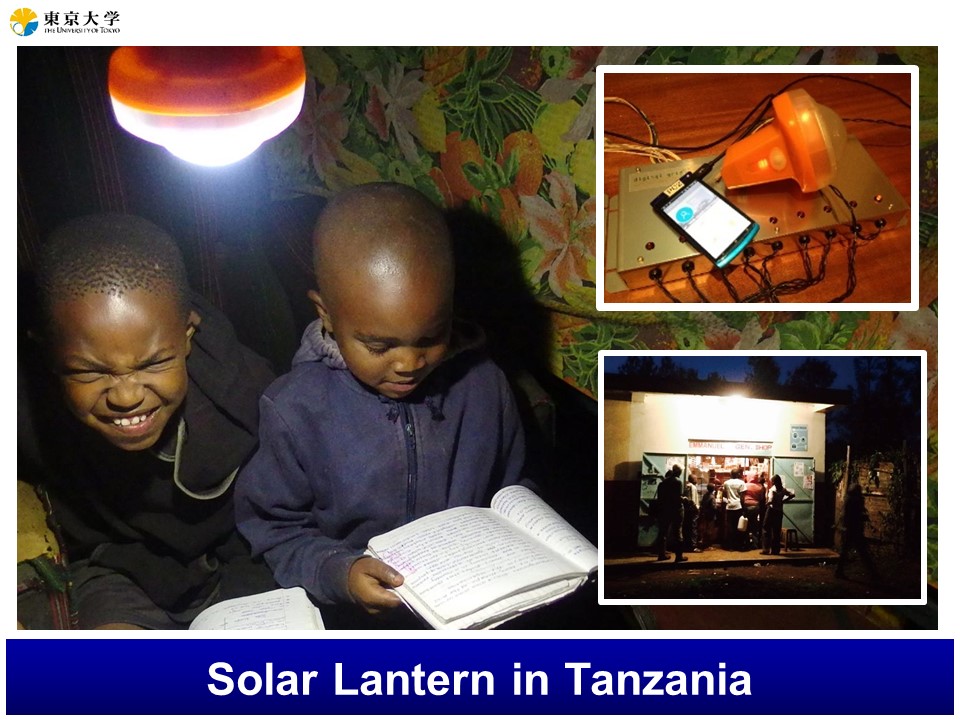 This is an example of the activities of the FSI. Digital Grid, a start-up company from the School of Engineering, is providing electricity to off-grid villages in Tanzania. They provide electricity with a “solar lantern,” composed of a battery and a solar panel. They are already supplying electricity to about two hundred and forty thousand (240,000) people. Their business is enabled by new information technology and mobile money payment system. With these solar lanterns, people can work and study during the night. Their local economy and quality of life have been greatly improved.
This is an example of the activities of the FSI. Digital Grid, a start-up company from the School of Engineering, is providing electricity to off-grid villages in Tanzania. They provide electricity with a “solar lantern,” composed of a battery and a solar panel. They are already supplying electricity to about two hundred and forty thousand (240,000) people. Their business is enabled by new information technology and mobile money payment system. With these solar lanterns, people can work and study during the night. Their local economy and quality of life have been greatly improved.
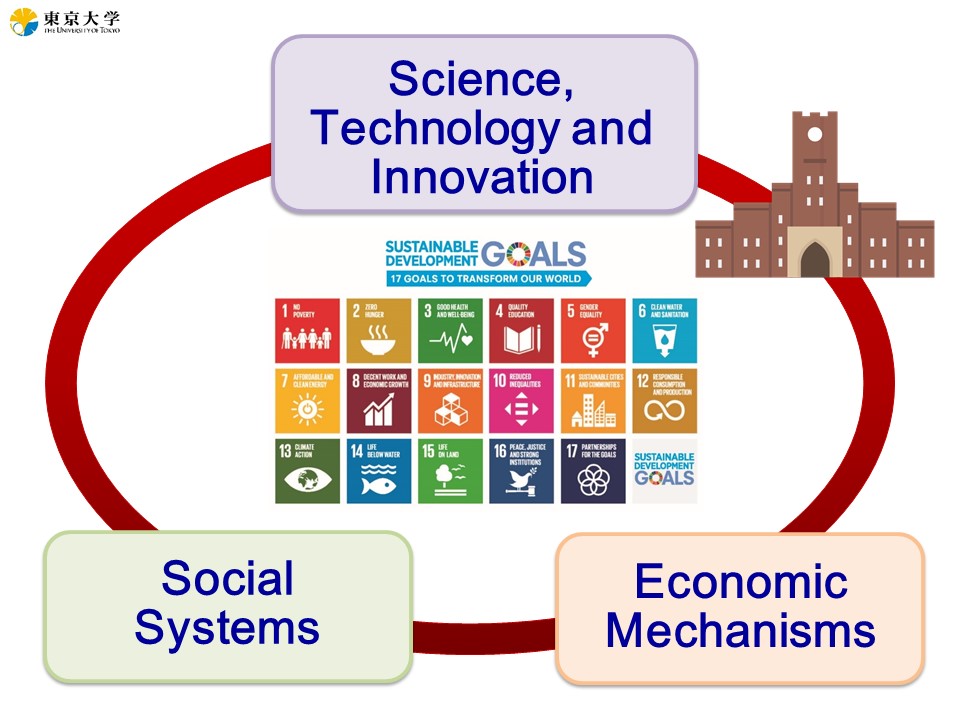 I believe that the 4th Industrial Revolution is a great opportunity for us to utilize new technologies to create a better future society for all. Universities have much strength in this area. Universities throughout the world have their own experiences and strengths, within their respective cultures. Enhancing collaborations between universities is very important to make a better society. I hope today’s forum will encourage many such collaborations.
I believe that the 4th Industrial Revolution is a great opportunity for us to utilize new technologies to create a better future society for all. Universities have much strength in this area. Universities throughout the world have their own experiences and strengths, within their respective cultures. Enhancing collaborations between universities is very important to make a better society. I hope today’s forum will encourage many such collaborations.
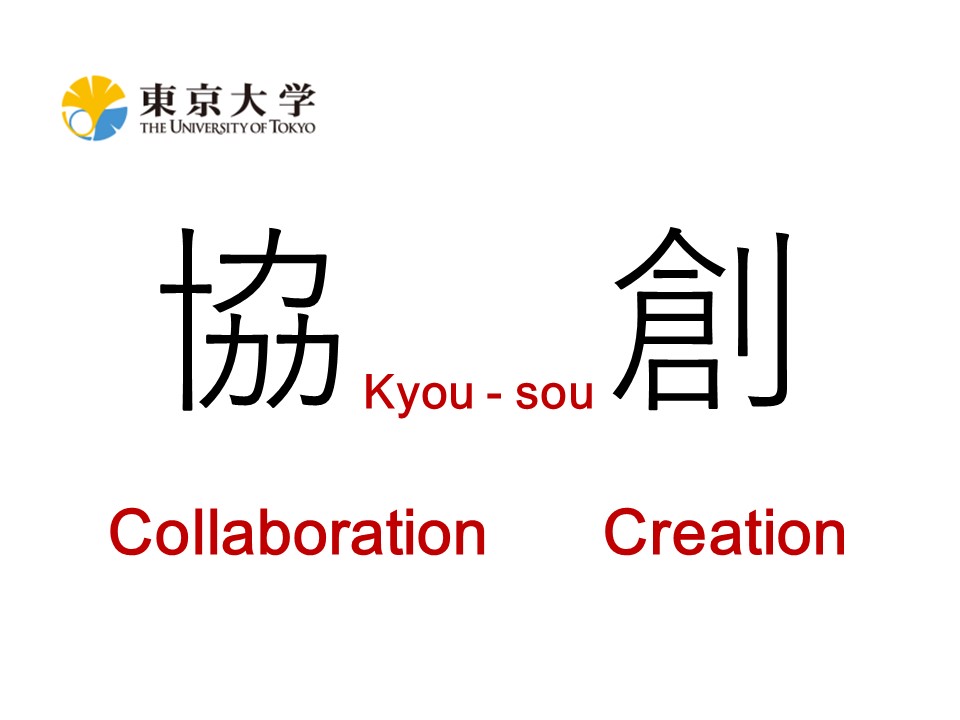 Before I close, I would like to show you two Chinese characters that describe this type of collaboration, something that also symbolizes the deep relationship between China and Japan.
Before I close, I would like to show you two Chinese characters that describe this type of collaboration, something that also symbolizes the deep relationship between China and Japan.
In Japanese, this grouping of characters reads “kyou-sou”. The character on the left is “kyou”, which means “collaboration” and “sou” meaning “creation” is on the right.
Let us create a new society together by cooperating with each other. I sincerely hope you will have a wonderful and fruitful time at the Forum.
Thank you.
Makoto Gonokami
President
The University of Tokyo
May 4, 2018
- [Beijing Forum 2018]Keynote Speeches: challenge, collaboration, and creation(Peking University)
- カテゴリナビ



